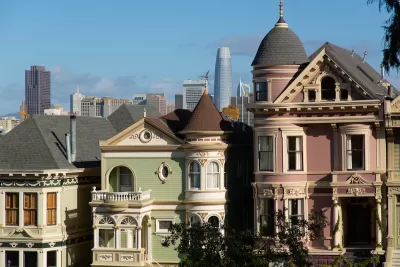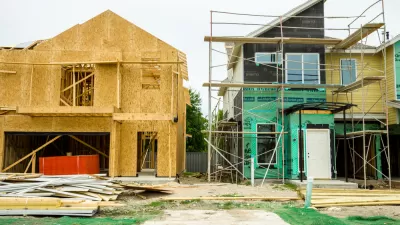For decades, many U,S, neighborhoods successfully resisted change at the expense of a few neighborhoods sacrificed to mass development. Is there a better way?

In a piece for Strong Towns, Charles Marohn calls for a new “housing bargain,” arguing that the pattern of housing development in American cities that has been accepted for decades is no longer working.
For Marohn, the “unspoken grand bargain” of U.S. development has been that “No neighborhood needs to change; they can all stay in their current form, but in exchange, one or two neighborhoods will experience radical transformation.”
This sacrificing of some neighborhoods for the sake of others perpetuates inequities and harms all types of neighborhoods. “The neighborhoods that avoid change aren’t static; they’re slowly declining. Costs keep increasing. The tax base does not. The lack of incremental adaptation means that they’re becoming less financially productive, more expensive to maintain and increasingly fragile.”
On the other side, neighborhoods that do experience transformation also see rising costs, displacement, and predatory practices.
Marohn proposes a new bargain: “Every neighborhood needs to experience a bit of change; they all need to evolve and mature, but no neighborhood should experience radical change.” By recognizing that change is inevitable, this approach allows for incremental, organic growth. According to Marohn, “For places to make this change, a conversation needs to happen at the community level. Residents need to understand that a neighborhood evolving over time is not something to fear but something to embrace. It’s the only way to ensure that our cities remain vibrant, adaptable and accessible to everyone.”
FULL STORY: America’s “Grand Housing Bargain” Is Broken. It’s Time for a New One.

Maui's Vacation Rental Debate Turns Ugly
Verbal attacks, misinformation campaigns and fistfights plague a high-stakes debate to convert thousands of vacation rentals into long-term housing.

Planetizen Federal Action Tracker
A weekly monitor of how Trump’s orders and actions are impacting planners and planning in America.

In Urban Planning, AI Prompting Could be the New Design Thinking
Creativity has long been key to great urban design. What if we see AI as our new creative partner?

How Trump's HUD Budget Proposal Would Harm Homelessness Response
Experts say the change to the HUD budget would make it more difficult to identify people who are homeless and connect them with services, and to prevent homelessness.

The Vast Potential of the Right-of-Way
One writer argues that the space between two building faces is the most important element of the built environment.

Florida Seniors Face Rising Homelessness Risk
High housing costs are pushing more seniors, many of them on a fixed income, into homelessness.
Urban Design for Planners 1: Software Tools
This six-course series explores essential urban design concepts using open source software and equips planners with the tools they need to participate fully in the urban design process.
Planning for Universal Design
Learn the tools for implementing Universal Design in planning regulations.
Gallatin County Department of Planning & Community Development
Heyer Gruel & Associates PA
JM Goldson LLC
Mpact (founded as Rail~Volution)
City of Camden Redevelopment Agency
City of Astoria
Jefferson Parish Government
Camden Redevelopment Agency
City of Claremont





























